Apr
11
2013
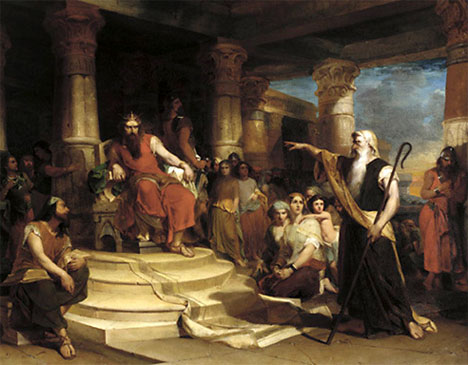 “…there is no sacrifice to Bathsheba…”
“…there is no sacrifice to Bathsheba…”
Jon Ericson asked this question on the Biblical Hermeneutics site:
To what extent is Psalm 51:4 poetic exaggeration?
The context of Psalm 51 is clear:
To the choirmaster. A psalm of David, when Nathan the prophet went to him, after he had gone in to Bathsheba.
These events are described in 2nd Samuel 11–12. In summary, David essentially murdered Uriah the Hittite in order to cover up an affair with Bathsheba, Uriah’s wife. So this verse causes me trouble:
Continue reading
Comments Off | tags: David, Hermeneutics, Psalms, Samuel | posted in Biblical Theology, Q&A
Sep
12
2012

or Mr White and the Black Hat
“There is a way that seems right to a man,
but its end is the way to death.” (Proverbs 14:12)
King David committed far worse sins than did King Saul. Saul was not an evil man, yet his judgments caused the deaths of many people, including Jonathan, his other sons and even the priests of God. Why did a reign that began so well end in such tragedy?
Continue reading
Comments Off | tags: Acts, AD70, Amalek, David, Edomites, Herod, Pentecost, Proverbs, Samuel, Saul | posted in Biblical Theology, Christian Life, Ethics, The Last Days
Jun
2
2012
In a recent sermon on 1 Samuel 30, Doug Wilson commented on David’s insistence that those who stayed behind to guard the supplies received an equal share of the plunder:
Continue reading
Comments Off | tags: David, Deuteronomy, Doug Wilson, Generosity, Samuel, Saul | posted in Biblical Theology, Christian Life, Ethics, Quotes
Mar
8
2012
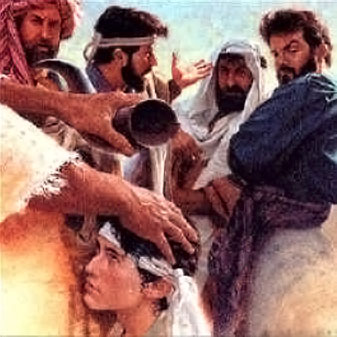 Check out the matrix pattern in 1 Samuel 16. It’s an easy one, but it’s so beautiful. And it makes sense of the (rare) physical description of David, related to the Holy Place. Each of the seven sections follows the matrix, but here is the overall pattern:
Check out the matrix pattern in 1 Samuel 16. It’s an easy one, but it’s so beautiful. And it makes sense of the (rare) physical description of David, related to the Holy Place. Each of the seven sections follows the matrix, but here is the overall pattern:
Continue reading
2 comments | tags: Baptism, Covenant Theology, David, John the Baptist, Samuel, Systematic typology | posted in Bible Matrix, Creation
Dec
11
2011
“So David (Sabbath – Creation)
Continue reading
Comments Off | tags: Abel, Atonement, Cain, David, Feasts, Genesis, High Priest, Samuel | posted in Bible Matrix
Nov
29
2010
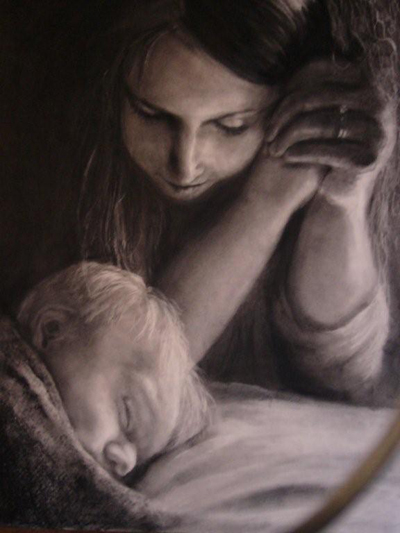
The Mosaic Tabernacle was silent. It was a place of mysterious words, dark sayings, carried out in secret. Eventually, it was violated, torn apart. It was the body of death, with sacrifices of blood carried out by Israelite priests. Like circumcision, it was a place of silent witness (the tablets) and the cutting off of the old leaven. (The fact that Hannah was not drunk makes this her holy war – the OC ministers of death could not drink wine in God’s presence.)
The tent was resurrected as the Tabernacle of David, an open place of dancing and loud music, with a new body of worshippers, both Jews and Gentiles. It was a new body of life, the flesh and the blood reunited in an impossible hybrid, with sacrifices of praise. [1] Like baptism, it was a place of reunion and bold testimony.
Hannah’s prayer was silent. She mouthed the words with a despair that felt like death. But after the miraculous delivery of the desired son, (offered to the Tabernacle as a symbolic ascension) she prayed aloud. Continue reading
Comments Off | tags: Baptism, Feasts, Numbers 5, Samuel | posted in Bible Matrix, Biblical Theology
Sep
9
2010
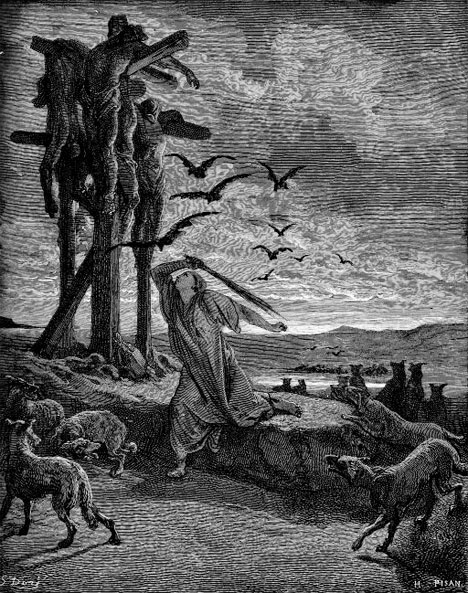
“Now Rizpah the daughter of Aiah took sackcloth and spread it for herself on the rock, from the beginning of harvest until the late rains poured on them from heaven. And she did not allow the birds of the air to rest on them by day nor the beasts of the field by night.” 2 Samuel 21:10
NOTE: THIS POST HAS BEEN REMIXED AND INCLUDED IN GOD’S KITCHEN.
At the heart of the Bible Matrix is Testing. Although all the major narratives follow the pattern, many of the minor ones do too. If Adam had not failed his initial “qualifying round,” he would have progressed to the next stage of dominion. We know this because we see others later in the Bible move beyond this first round to greater glory. For instance, Daniel’s first challenge mirrors Adam’s challenge exactly. He was offered kingdom food and refused it.
Continue reading
Comments Off | tags: AD70, Atonement, Exodus, Herod, Jericho, Nebuchadnezzar, Postmillennialism, Samuel, Temple, Two witnesses, Witness | posted in Biblical Theology, Christian Life, The Last Days
Nov
12
2009
 As the end of the ‘Creation week’ (slavery to Sabbath) that created a new nation, there were twelve judges. Twelve is the ‘offspring’ number, being the three of heaven married, multiplied with, the four of the Land.[1] However, we know these brave ‘champions’ were not a sabbath society but a rescue operation after the failure of the Levites.
As the end of the ‘Creation week’ (slavery to Sabbath) that created a new nation, there were twelve judges. Twelve is the ‘offspring’ number, being the three of heaven married, multiplied with, the four of the Land.[1] However, we know these brave ‘champions’ were not a sabbath society but a rescue operation after the failure of the Levites.
Continue reading
Comments Off | tags: Bible Chronology, Bible history, Bible Matrix, Boaz, Judges, Obed, Ruth, Samson, Samuel | posted in Biblical Theology
May
7
2009
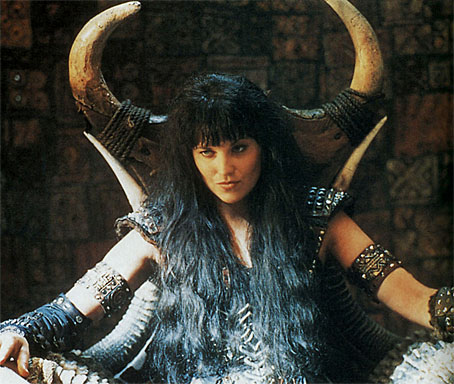
The Nazirite Vow
(Article requested by Drew J.)
This vow in Numbers 6 follows the “inspection of jealousy” in Numbers 5. Mark Horne observed that, just as the woman in Numbers 5 was to be inspected for harlotry with her hair untamed, so the Nazirite (whether male or female) was not to cut his or her hair. A Nazirite is a human picture of the church as a warrior bride. Hair is glory. Hair is the cloud of angels (and now, saints) surrounding the throne of God.
“Therefore the woman ought to have a symbol of authority on her head, because of the angels.” (1 Cor. 11:10)
A woman is the glory of her man. A woman’s hair is a symbol of submission, but also a symbol of her own “cloud of angels” – her godly offspring (See Ezekiel 5 for the children of Israel symbolised as the prophet’s hair, Micah 1:16, Matthew 10:30 and also my comments on Nehemiah and his hair-pulling). In battle, a Nazirite was like a blazing torch (the Ark-chariot/Adam) and smoking firepot (the smoke clouds of the incense altar/Eve army), parting his enemies like the pillar of God.
The hair is her “crop”, the twelve stars around her head (Rev. 12), and the question constantly posed to Israel concerns her role as God’s mediatorial Land. Is her crop one of thorns and thistles, or is it godly grain? This is also the question in Numbers 5, and the Lord put Israel to this exact test after the idolatry with the golden calf. The “harlots” were slain with the Levitical sword.
Continue reading
3 comments | tags: Adam, David, James Jordan, John the Baptist, Judges, Nazirite, Numbers 5, Numbers 6, Obed, Paul, Revelation, Samson, Samuel, serpent, Showbread, Tabernacle, Uriah, Wisdom | posted in Against Hyperpreterism, Biblical Theology
 “…there is no sacrifice to Bathsheba…”
“…there is no sacrifice to Bathsheba…”






























